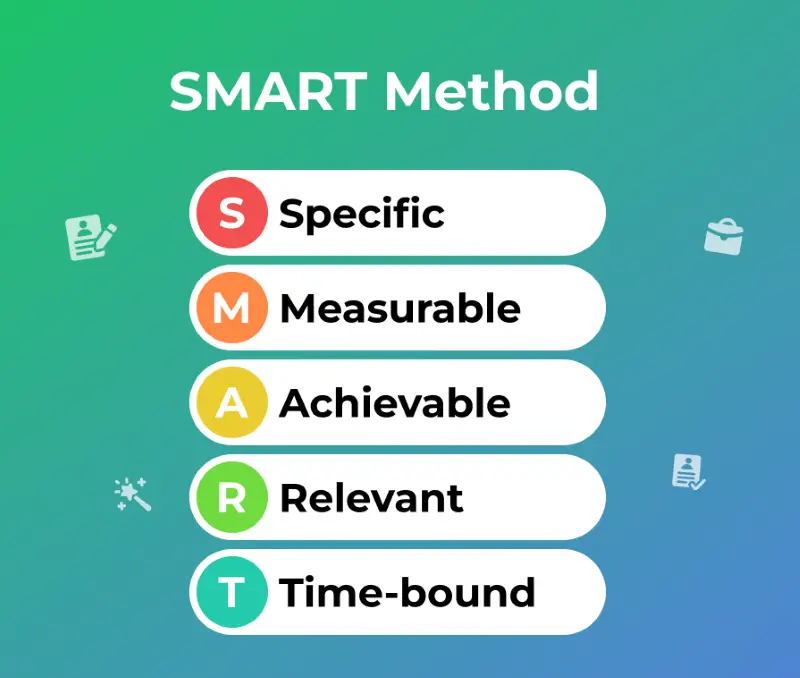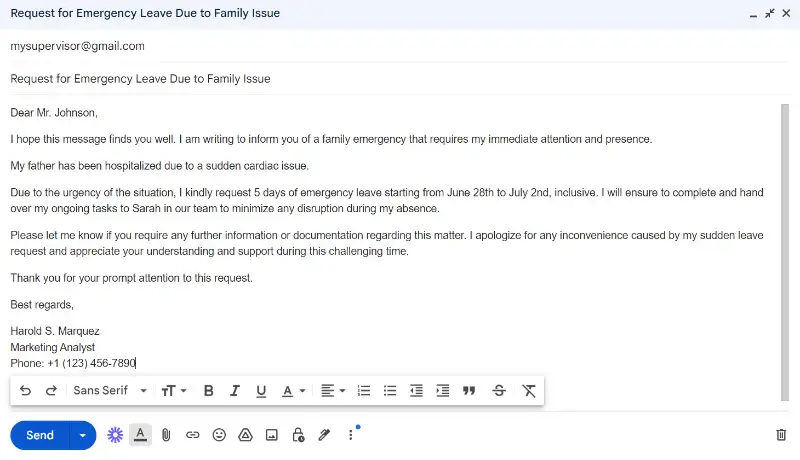Preparing for a job interview can feel overwhelming, but with the right approach, you can stand out from the competition. One powerful tool to help you deliver clear, focused answers is the SMART method.
This approach helps you structure your responses in a way that showcases your qualifications and communication skills.
In this article, we’ll explore how to apply the SMART method to interview questions to make a lasting impression.
What is the SMART method?
The SMART answers interview method is a popular approach for structuring your responses, particularly those that ask about your past experiences or behaviors. It ensures that your reply is clear, concise, and well-organized.

| Component | Description |
|---|---|
| Situation | Provide a detailed description of the context or background of the situation. Explain what was happening and include specific details to paint a clear picture of the circumstances you were dealing with. |
| Task | Clearly outline the task or challenge you were assigned. Describe what was expected of you and the objectives you needed to achieve. Be specific about your responsibilities in the context of the task. |
| Actions | Detail the steps and actions you took to address the task or challenge. Explain your approach, decisions, and any strategies you employed. This section in resume should highlight your problem-solving skills and initiative. |
| Results | Describe the measurable outcomes or impact of your actions. Include metrics, improvements, or benefits that resulted from your efforts. This shows the effectiveness of your actions. |
| Timeframe | Indicate the timeframe in which your actions were taken and the results achieved. This offers context on how quickly you were able to implement changes and see results. |
SMART method for interview questions
Below are common SMART interview questions and answers you can use as an example when composing your own.
This question is about your background and how it aligns with the job.
- Specific: Share details about your experience relevant to the role, your qualifications, and how your career path has led to this opportunity.
- Measurable: Quantify achievements or results when applicable (e.g., years of experience, promotions).
- Achievable: Highlight specific milestones you’ve reached.
- Relevant: Focus on skills and experiences that match the job description.
- Time-bound: Summarize your career journey, leading to the current moment.
SMART answer format example:
"I have 5 years of experience in project management, where I’ve led cross-functional teams to successfully complete projects on time and within budget. At my previous job, I managed a $2 million budget and reduced project delivery time by 15% over three years. Now, I’m seeking to bring my leadership and process improvement skills to your team."
In this interview SMART method question, you should demonstrate strengths that align with the job.
- Specific: Choose a strength that applies directly to the role.
- Measurable: If possible, provide quantifiable examples of how it has benefited past employers.
- Achievable: Highlight how you use this strength to solve problems.
- Relevant: Ensure it is one that the employer values.
- Time-bound: Discuss a specific instance where you utilized this quality.
Example:
"One of my key strengths is problem-solving. In my previous role, I improved team productivity by 20% over a year by identifying bottlenecks in our workflow and implementing a new project management tool. This led to smoother communication and quicker turnaround times."
What is your biggest weakness?
The goal is to discuss a real weakness without damaging your candidacy while showing improvement.
- Specific: Mention a genuine weakness, not a disguised strength.
- Measurable: Briefly explain how this weakness has impacted you.
- Achievable: Share actions you’ve taken to improve.
- Relevant: Make sure this weakness won’t undermine your ability to do the job well.
- Time-bound: Describe the progress you’ve made or are making to improve.
Example of SMART answers:
"I used to struggle with delegation because I preferred to handle tasks myself to ensure accuracy. However, I realized this was limiting the growth of my team. Over the past six months, I’ve worked on trusting my team more and have set up weekly check-ins to ensure accountability. As a result, I’ve seen improved team collaboration and faster project completion times."
Tell me how you handled a challenge at work.
This is one of the SMART interview questions that evaluates problem-solving skills and resilience.
- Specific: Focus on a specific challenge you faced.
- Measurable: Quantify the impact of the challenge (e.g., time lost, financial loss, team impact).
- Achievable: Explain the solution you implemented.
- Relevant: Relate the challenge to skills needed in the job you’re applying for.
- Time-bound: Include the timeframe for identifying the problem and implementing the solution.
Example:
"In my last role as a marketing manager, our biggest client’s project was falling behind schedule, which could have cost us $100,000 in revenue. I gathered my team, re-prioritized tasks, and brought in a freelance designer to handle the overflow. We managed to deliver the project on time, avoiding penalties, and even increased customer satisfaction by 10% in the following client feedback survey."
Where do you see yourself in five years?
This assesses your long-term vision and alignment with the company’s goals.
- Specific: Mention a clear career goal or position.
- Measurable: Describe progress or milestones you aim to achieve along the way.
- Achievable: Ensure your goal is realistic.
- Relevant: Align your vision with the company's opportunities for growth.
- Time-bound: Mention where you expect to be at the end of five years.
Example of SMART interview answers:
"In five years, I see myself in a senior management role, where I can lead larger teams and projects. I plan to continuously develop my leadership skills, aiming for a project completion rate of over 95%. I also hope to contribute to strategic planning within the company as I grow with it."
This question helps the interviewer understand your motivation and research.
- Specific: Mention a specific reason related to the culture, products, or mission.
- Measurable: Point to a particular aspect of the company that stands out.
- Achievable: Express how your skills will contribute to the success.
- Relevant: Relate the values or achievements to your professional goals.
- Time-bound: Reference a current or future project the company is working on.
Example:
"I admire your company’s commitment to sustainability and innovation, especially with the recent launch of your eco-friendly product line. With my background in product development and a focus on sustainability, I’m excited about the opportunity to help further develop these initiatives."
Describe a time you worked on a team and what your role was.
This question gauges teamwork and collaboration skills.
- Specific: Choose a specific project or situation.
- Measurable: Explain the team’s goals and your contributions.
- Achievable: Focus on the actions you took and the impact they had.
- Relevant: Relate the teamwork experience to the role you're applying for.
- Time-bound: Specify the timeframe and results of the project.
Example:
"I was part of a team tasked with launching a new marketing campaign in just three months. I took on the role of coordinating between the design and analytics teams, ensuring that the campaign’s visuals aligned with our target audience insights. As a result, we launched on time, and the campaign increased leads by 25% in the first month."
This question asks you to clearly show why you're the best candidate for the position.
- Specific: Highlight key skills and experiences that make you a great fit.
- Measurable: Quantify your past achievements where possible.
- Achievable: Show how your skills can solve the company's problems.
- Relevant: Align your strengths with the job description and company goals.
- Time-bound: Demonstrate immediate or near-term impact you can bring.
Example of SMART answers for interviews:
"With my 6 years of experience in sales, I have consistently exceeded targets by at least 15% annually. At my current position, I implemented a new customer engagement strategy that increased client retention by 20%. I believe my ability to drive results and develop strong client relationships will directly benefit your sales team and help you achieve your growth targets this year."
How do you prioritize tasks?
This question explores your organizational skills and ability to manage competing demands.
- Specific: Mention the methods you use for prioritization.
- Measurable: Provide an example of how this approach improved outcomes.
- Achievable: Describe how you balance urgent versus important tasks.
- Relevant: Align your approach to the job’s expectations.
- Time-bound: Include the timeframe for when your prioritization led to a specific result.
Example:
"I prioritize tasks using a combination of the Eisenhower Matrix and a project management tool like Trello. I categorize tasks based on urgency and importance and tackle high-priority items first. For example, during a recent project, I was able to deliver a critical presentation 3 days early. I broke down the work and allocated enough time for urgent tasks while keeping lower-priority ones in check. This approach helped me stay ahead and prevented last-minute stress."
Tips for practicing the SMART interview method
Choose experiences that demonstrate your abilities and align with the job you're applying for. Focus on achievements where you had a significant impact.
Match your experiences with the key skills and competencies listed in the job description.
Have a friend, mentor, or career coach ask you common interview questions, and practice answering using the SMART method. Ask for detailed feedback on the clarity, structure, and relevance of your responses.
Recording your SMART answers helps you identify areas where you need to improve, like pace or overuse of filler words. Assess how clear, concise, and impactful you sound. Adjust for more structure or depth as needed.
Keep your speech within a 1–2 minute range. This helps ensure your answers are clear and concise without unnecessary details.
FAQ
- Is the SMART method suitable for all job roles?
- Yes, it can be used for interviews across a wide range of positions. Whether you're applying for a leadership position, a technical, or an entry-level one, the SMART method helps you present clear examples of your achievements.
- What if the interviewer doesn’t specifically ask behavioral questions?
- You can still use this technique to answer situational or competency-based questions. When asked about how you would handle a situation or why you're a good fit for the role, structure your response to clearly demonstrate your thought process.
- Can I apply this technique to answer "what-if" scenarios?
- For hypothetical questions, treat the scenario as the "Situation" and explain how you would approach it step-by-step. Employ the structure to show your thought process and how you would achieve a positive outcome.
- Is the SMART method useful for discussing weaknesses or setbacks?
- Yes! Utilize it to describe challenges you've faced, focusing on what you learned and how you turned the experience into a positive outcome. This showcases your ability to grow and adapt.
- Can I use it on my resume or cover letter?
- Absolutely. While more common in interviews, this structure can also frame concise achievements in your CV bullets or impactful stories in a cover letter.
Conclusion
Mastering the SMART interview technique is a game-changer in job interviews.
It enables you to deliver concise, focused answers that show hiring managers you're not only qualified but also organized and strategic.
By practicing this approach, you’ll be better equipped to highlight your achievements and align them with the company's goals, leaving a lasting positive impression.
Create your professional Resume in 10 minutes for FREE
Build My Resume















